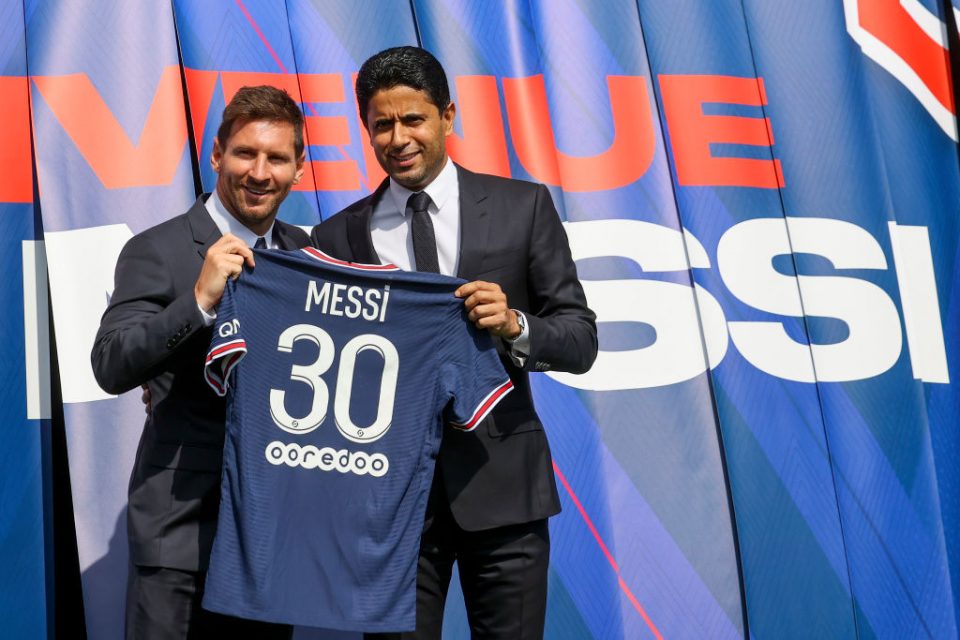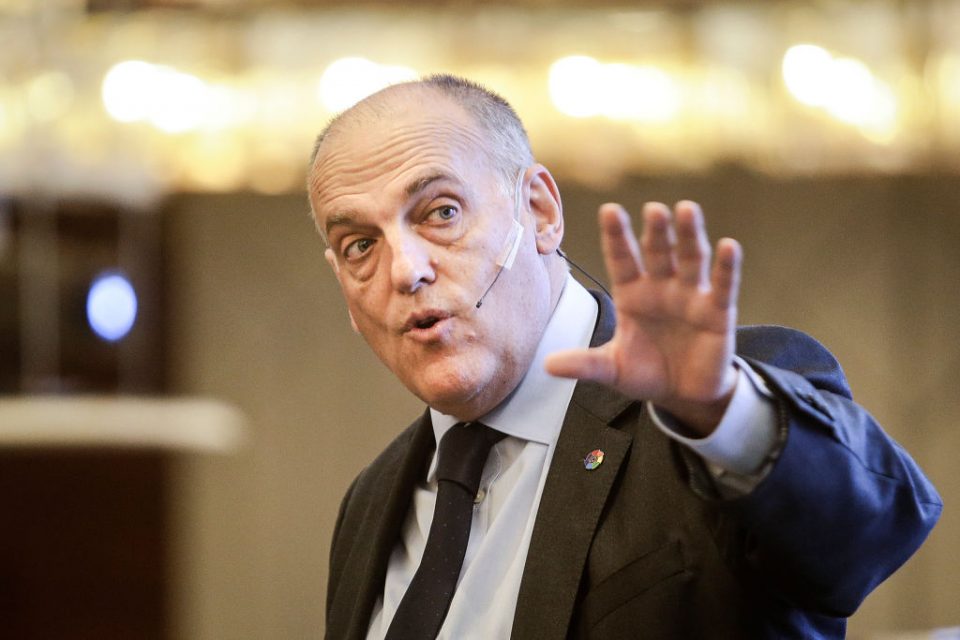Why Spain’s LaLiga believes Uefa and other leagues should follow its lead

Spain has a long and rich tradition of shaping how football is played.
It has given us the great Real Madrid sides of the 1950s; Pep Guardiola and his all-conquering Barcelona; the national team who swept all major men’s international tournaments from 2008 to 2012; tiki-taka.
Britain may be the birthplace of the game but Spain has had a huge influence on what it has become.
Now it wants to have a similar effect on how football is regulated.
LaLiga, which runs Spain’s top two divisions, requires its clubs to abide by what it believes are the strictest financial rules of any league in the world. As Uefa considers how to modernise its own economic controls, Financial Fair Play (FFP), LaLiga is urging the European governing body to follow its lead.
“Spain has a different financial fair play than other leagues, which is strict, and we think this should be implemented in different countries,” LaLiga president Javier Tebas said last week.
“We don’t think Uefa is doing things correctly. We’re very clear about the approaches that we want. And we’re also very clear about our concerns. The leagues have a lot of know-how of financial control, and we know the effects wrong decisions can have. We hope they make the right decisions.”
One central plank of LaLiga’s financial rules distinguishes them from Uefa’s FFP and other similar cost-control measures in domestic competitions such as the Premier League. Instead of punishing clubs after the event, LaLiga adopts a proactive approach that effectively prevents its teams from overspending in the first place.
Spain’s 42 professional clubs are obliged to submit their most up-to-date financial data, which LaLiga’s analysts use to set squad cost limits for the following season. Teams receive their budgets before the transfer window opens so they know how much they can spend. The sum, which covers players and coaches, can be split between transfer fees and wages.
“Let’s not just certify what the financial position of clubs is, which is what Uefa’s FFP approach is, but let’s check our foreseen financial position of our clubs for the next season and act beforehand,” LaLiga’s director of economic control, Luis Manfredi, told City A.M. “Let’s see what the potential problems will be and act, preventing rather than trying to fix.”
Why LaLiga drew up its economic controls
LaLiga introduced the rules in 2013 in an attempt to reverse an alarming trend. In the previous five years, more than 20 teams in Spain’s top two divisions had experienced insolvency procedures. The league’s existing financial rules, based on Uefa’s, were proving ineffective at turning the tide. “A dramatic change was needed,” said Manfredi.
Tebas began his first term that year, determined to grow LaLiga’s appeal to overseas broadcasters. For that, he reasoned he needed to centralise the sale of media rights – previously, clubs were allowed to sell their own, leading to a gulf between Real Madrid, and Barcelona and the rest – and make every team financially sustainable.
The changes have achieved what Tebas set out to do. With one or two notable exceptions, Spanish football is now much healthier. The gap between what the biggest clubs receive in central revenues has shrunk from a ratio of 13:1 to 3.5:1. LaLiga sold its US broadcast rights to ESPN this year for more than NBC pays to show the Premier League.

Uefa accepts its FFP rules need reform and has shared new proposals with leagues and clubs for next season onwards. Under the plans, any teams playing in European competition such as the Champions League would be subject to a salary cap, likely set at a percentage of their income. Those who exceed it would incur a luxury tax, a fine pegged to the amount overspent.
While LaLiga considers it a step in the right direction, it does not think Uefa’s FFP 2.0 goes far enough. “For us, a salary cap or any regulation aimed at adjusting your squad cost to your own resources and economic capability is good as long as it is within a strong framework that prevents clubs from breaching that rule,” said Manfredi.
Sanctions are one of the sticking points. FFP came to be regarded as toothless as breaches by state-backed clubs such as Paris Saint-Germain and Manchester City triggered fines but not, when the legal arguments were done, a Champions League ban. Tebas has never hidden his distaste and LaLiga argues that a luxury tax would be a similarly ineffective deterrent.
“A luxury tax in the end only means that your squad cost is unlimited but higher than expected,” said Manfredi. “If I’m able to breach the limit with an additional payment, then what is the difference to a system with no limit but with additional cost? We find it positive but not enough unless other kinds of sanctions – sporting sanctions – are imposed in an effective way.”
In a sense, LaLiga does not believe in sanctions at all. It’s economic controls give it the power to prevent Spanish clubs from making signings that take them over budget, meaning breaches simply aren’t possible. “On the other hand, if you look at it from another perspective, that is the toughest sporting sanction that a club can have,” said Manfredi.
Are Spain’s strict rules to blame for Barcelona losing Messi?
Not all Spanish teams are aligned with LaLiga’s vision. Barcelona blamed the budgetary rules for their inability to offer Lionel Messi a new contract earlier this year. Real Madrid president Florentino Perez, meanwhile, has repeatedly clashed with Tebas, most recently over the European Super League and CVC Capital Partners’ investment in LaLiga.
Both of Spain’s traditional giants have lost star players and regressed, as evidenced by their defeats in the Champions League this week and Atletico Madrid breaking their duopoly on the title last season. But LaLiga’s position is that neither case is to do with its rules being too strict, and instead blames state-backed clubs for distorting the transfer market.
“The ideal situation would be that all leagues would compete in a fair way. That is not the case,” said Manfredi. “If there is a problem in the players in our league [leaving] it is due to many factors, for instance taxation in other countries, but not because our clubs don’t have enough resources. They do have those resources but other leagues compete in an unfair way.”

Figures released by LaLiga this week show Real Madrid were assigned a budget of €739m for transfers and wages in the summer window. The club tried to spend a large slice of it on Kylian Mbappe, only to find Paris Saint-Germain unwilling to sell a player who will be a free agent next year, even when presented with bids of around €200m.
“The case of Barcelona is different because there are other specific factors for that club,” said Manfredi. “Real Madrid was ready to bring in important players. They didn’t arrive not because the club didn’t have the resources but because other clubs involved in the transactions didn’t have sporting or financial criteria for supporting their decisions, but rather other criteria which are, for us, not correct at all. That’s why we demand strong action from Uefa to prevent this distortion of competition.”
How likely is it that Uefa will adopt LaLiga’s rules in FFP?
LaLiga is not alone in believing Uefa’s FFP reforms should be tougher. According to reports in Germany last week, the Bundesliga also opposes a luxury tax. Tebas, who represents umbrella body European Leagues on Uefa’s executive committee, says stricter rules are favoured by “the Premier League, all sorts of different leagues – maybe the French one not so much.”
Complicating LaLiga’s attempts to shape FFP is the rise to greater prominence of Nasser Al-Khelaifi, the president of Qatar-owned Paris Saint-Germain, in the two organisations drawing up the new rules, Uefa and the European Club Association. Still, there is optimism in Madrid that their lobbying, and the example they have set, can win hearts and minds.
“I think Uefa is prepared to talk about it,” said Tebas. “I can’t say anything now but I’m very optimistic because we hold meetings and we can see that they listen to our arguments.”

“Some of the proposals have at least some approach more similar to our model,” said Manfredi. “They are talking about some kind of salary cap measurement based on more recent data rather than audited data from two seasons ago.”
Whether other countries can be persuaded to adopt LaLiga’s economic controls is another question. “Some national leagues might be in favour,” said Manfredi, although he believes that in the Premier League Manchester City and Chelsea would attempt to corral opposition to any moves that might limit their owners’ capital injections.
If Uefa does not heed their warnings and do more to prevent breaches of FFP, LaLiga’s top officials believes the result will be the increasing polarisation of European football. “What will happen is we will continue as was the case in Spain before 2013,” said Manfredi. “We will have an unproductive inflation rate in players’ wages. And competition will be less interesting for the fans because they will start thinking there is no competition.”
